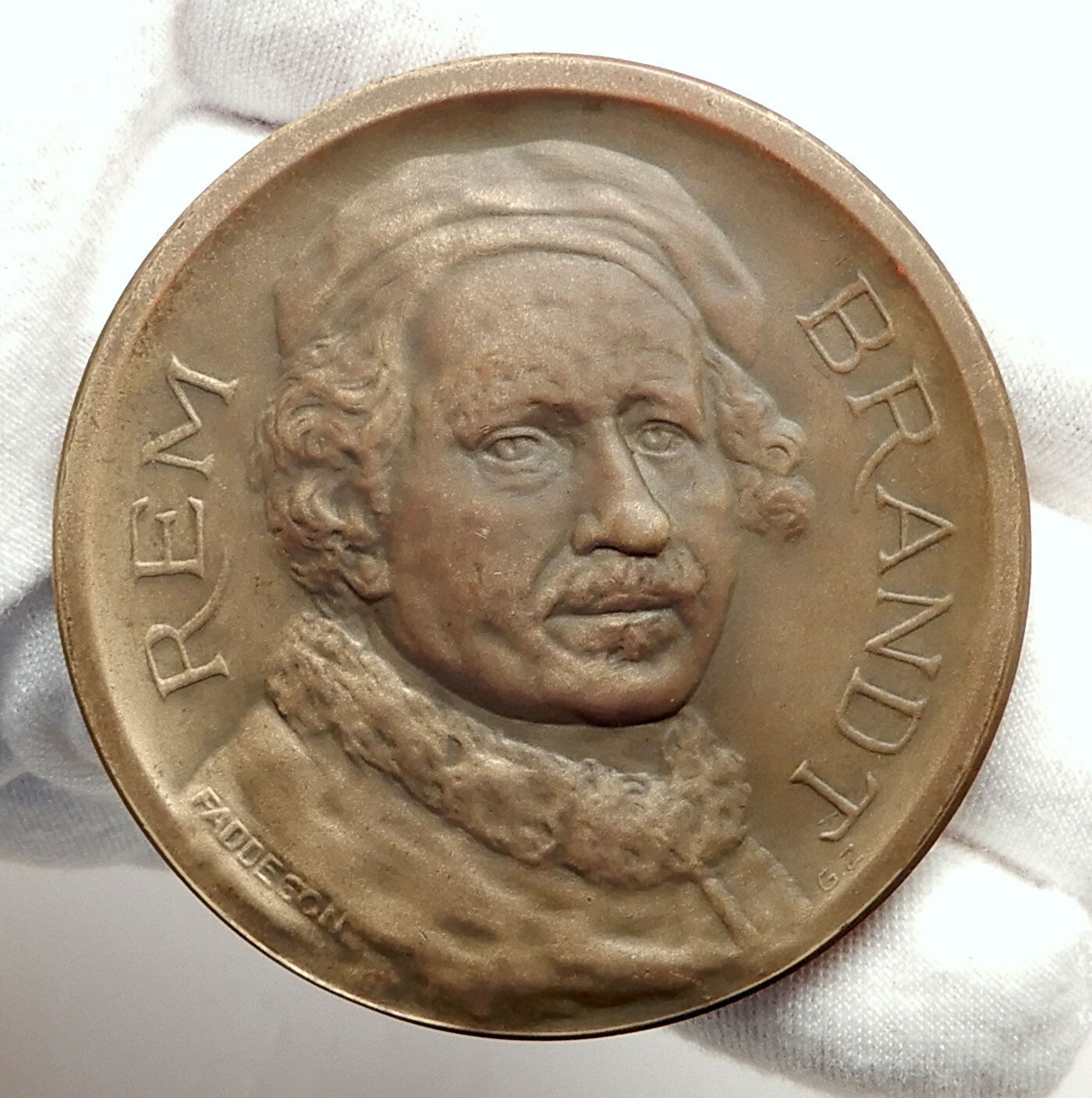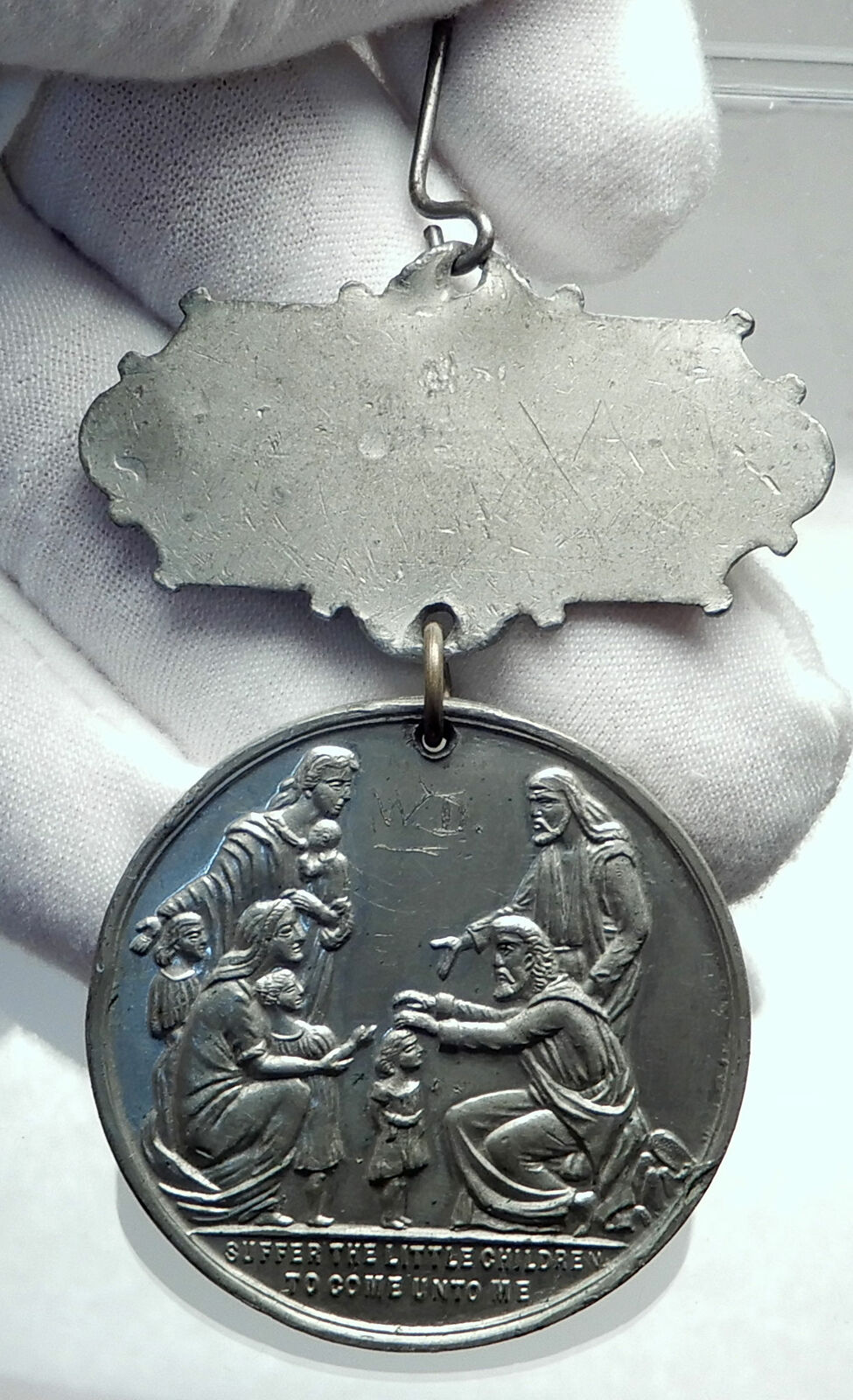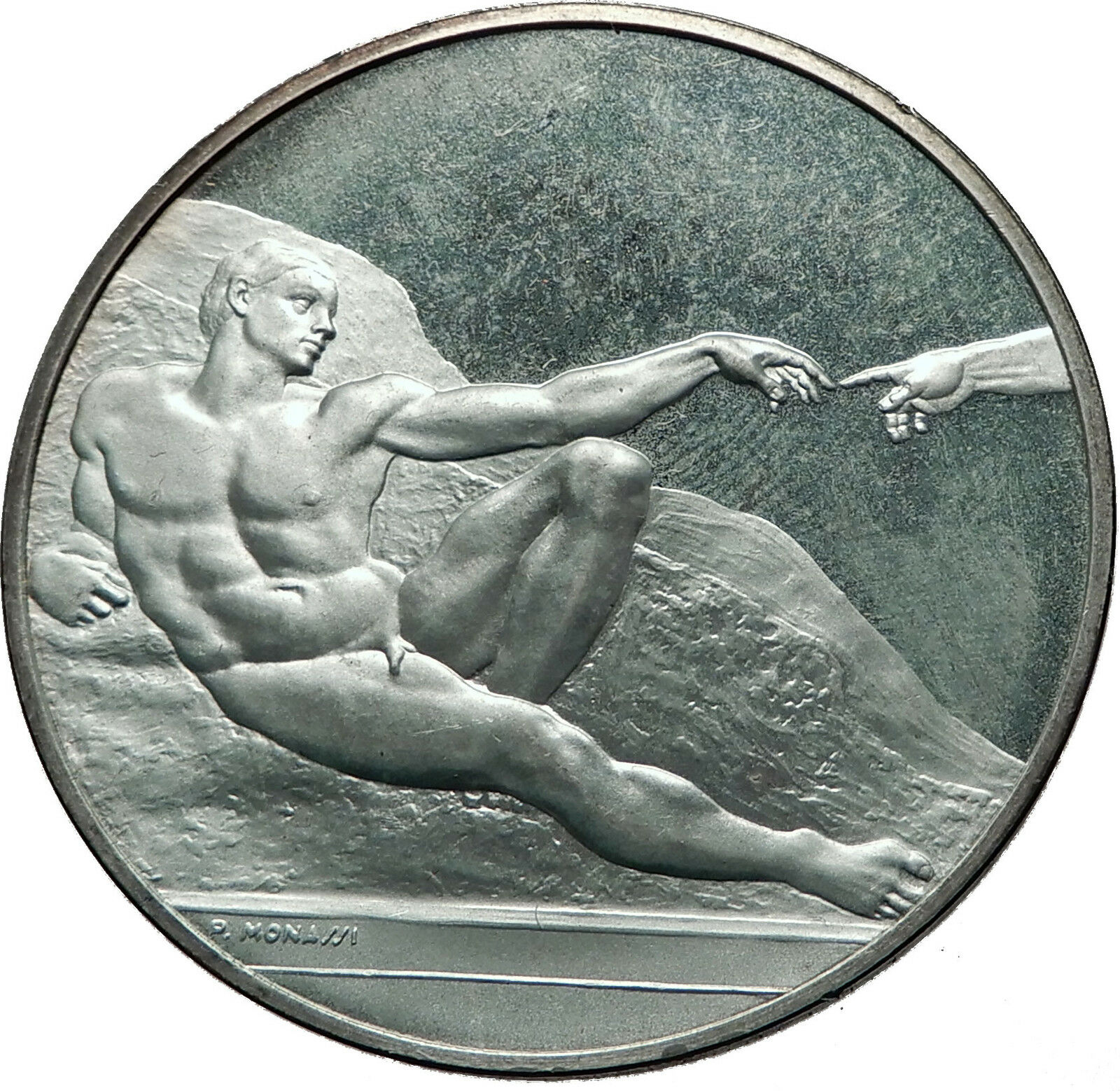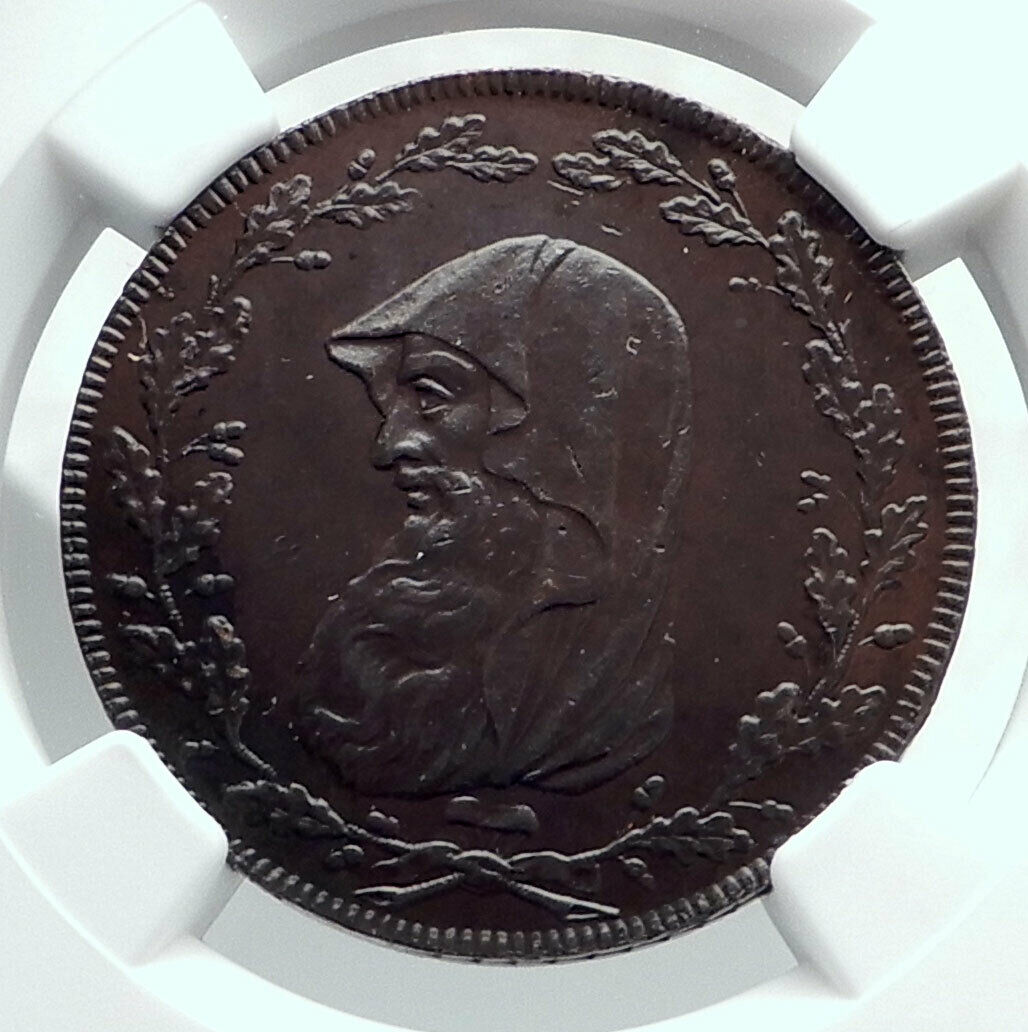|
Argentina
Romulo S. Naon – Ambassador to the United States
1915 Bronze Medal 64mm (101.48 grams)
ROMULO S. NAON 1915, Naon facing right, wreath with berries around.
CIVIS INCORRVPTA LIBERTATE REIPVBLICAE DEDITVS FAMA CELEBRATVS VIRVS FECIT LAVDEM SODALES PLAVDVNT, Wreath and dashed line below.
You are bidding on the exact item pictured, provided with a Certificate of Authenticity and Lifetime Guarantee of Authenticity.
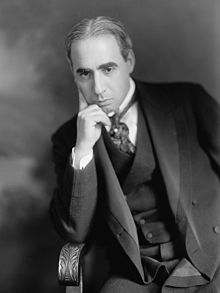 Rómulo Sebastián Naón Peralta Martínez (1875–1941), was an Argentine lawyer, politician and Ambassador to the United States from 1910 to 1919. Rómulo Sebastián Naón Peralta Martínez (1875–1941), was an Argentine lawyer, politician and Ambassador to the United States from 1910 to 1919.
He was born in 1876 in Buenos Aires to Julio César Naón Capanegra and Felisa Peralta Martínez de Oliden. He married Isabel Rodríguez Marcenal. In 1914 he attended the Niagara Falls peace conference to reduce tensions between Mexico and the United States. He died in 1941.
On March 4, 1915 Naón and two others received the Thanks of Congress and were awarded Congressional Gold Medals (P.L. 63-75, 38 Stat. 1228). The statute reads as follows.
Resolved by the Senate and House of Representatives of the United States of America in Congress assembled, That the thanks of Congress to their excellencies be, and they are hereby, presented to their excellencies Señor Domício da Gama, Señor Rómulo S. Naón, and Señor Eduardo Suárez for their generous services as mediators in the controversy between the Government of the United States of America and the leaders of the warring parties in the Republic of Mexico. That the President of the United States is hereby authorized and requested to cause to be made and presented to their excellencies Señor Domicio da Gama, Señor Rómulo S. Naón, and Señor Eduardo Suárez suitable gold medals, appropriately inscribed, which shall express the high estimation in which Congress holds the services of these distinguished statesmen, and the Republics which they represent, in the promotion of peace and order in the American continent.
 Argentina, officially the Argentine Republic (Spanish: República Argentina), is a federal republic located mostly in the southern half of South America. Sharing the bulk of the Southern Cone with its neighbor Chile to the west, the country is also bordered by Bolivia and Paraguay to the north, Brazil to the northeast, Uruguay and the South Atlantic Ocean to the east, and the Drake Passage to the south. With a mainland area of 2,780,400 km2 (1,073,500 sq mi), Argentina is the eighth-largest country in the world, the second largest in Latin America, and the largest Spanish-speaking nation. It is subdivided into twenty-three provinces (Spanish: provincias, singular provincia) and one autonomous city (ciudad autónoma), Buenos Aires, which is the federal capital of the nation (Spanish: Capital Federal) as decided by Congress. The provinces and the capital have their own constitutions, but exist under a federal system. Argentina claims sovereignty over part of Antarctica, the Falkland Islands (Spanish: Islas Malvinas), and South Georgia and the South Sandwich Islands. Argentina, officially the Argentine Republic (Spanish: República Argentina), is a federal republic located mostly in the southern half of South America. Sharing the bulk of the Southern Cone with its neighbor Chile to the west, the country is also bordered by Bolivia and Paraguay to the north, Brazil to the northeast, Uruguay and the South Atlantic Ocean to the east, and the Drake Passage to the south. With a mainland area of 2,780,400 km2 (1,073,500 sq mi), Argentina is the eighth-largest country in the world, the second largest in Latin America, and the largest Spanish-speaking nation. It is subdivided into twenty-three provinces (Spanish: provincias, singular provincia) and one autonomous city (ciudad autónoma), Buenos Aires, which is the federal capital of the nation (Spanish: Capital Federal) as decided by Congress. The provinces and the capital have their own constitutions, but exist under a federal system. Argentina claims sovereignty over part of Antarctica, the Falkland Islands (Spanish: Islas Malvinas), and South Georgia and the South Sandwich Islands.
 
Flag & Coat of arms
The earliest recorded human presence in the area of modern-day Argentina dates back to the Paleolithic period. The country has its roots in Spanish colonization of the region during the 16th century. Argentina rose as the successor state of the Viceroyalty of the Río de la Plata, a Spanish overseas viceroyalty founded in 1776. The declaration and fight for independence (1810-1818) was followed by an extended civil war that lasted until 1861, culminating in the country’s reorganization as a federation of provinces with Buenos Aires as its capital city. The country thereafter enjoyed relative peace and stability, with massive waves of European immigration radically reshaping its cultural and demographic outlook. The almost-unparalleled increase in prosperity led to Argentina becoming the seventh wealthiest developed nation in the world by the early 20th century.
After 1930, Argentina descended into political instability and periodic economic crises that pushed it back into underdevelopment, though it nevertheless remained among the fifteen richest countries until the mid-20th century. Argentina retains its historic status as a middle power in international affairs, and is a prominent regional power in the Southern Cone and Latin America. Argentina has the second largest economy in South America, the third-largest in Latin America and is a member of the G-15 and G-20 major economies. It is also a founding member of the United Nations, World Bank, World Trade Organization, Mercosur, Union of South American Nations, Community of Latin American and Caribbean States and the Organization of Ibero-American States. It is the country with the second highest Human Development Index in Latin America with a rating of “very high”. Because of its stability, market size and growing high-tech sector, Argentina is classified as an upper-middle-income economy in the 2018 fiscal year.
|





 Rómulo Sebastián Naón Peralta Martínez (1875–1941), was an Argentine lawyer, politician and Ambassador to the United States from 1910 to 1919.
Rómulo Sebastián Naón Peralta Martínez (1875–1941), was an Argentine lawyer, politician and Ambassador to the United States from 1910 to 1919. Argentina, officially the Argentine Republic (Spanish: República Argentina), is a federal republic located mostly in the southern half of South America. Sharing the bulk of the Southern Cone with its neighbor Chile to the west, the country is also bordered by Bolivia and Paraguay to the north, Brazil to the northeast, Uruguay and the South Atlantic Ocean to the east, and the Drake Passage to the south. With a mainland area of 2,780,400 km2 (1,073,500 sq mi), Argentina is the eighth-largest country in the world, the second largest in Latin America, and the largest Spanish-speaking nation. It is subdivided into twenty-three provinces (Spanish: provincias, singular provincia) and one autonomous city (ciudad autónoma), Buenos Aires, which is the federal capital of the nation (Spanish: Capital Federal) as decided by Congress. The provinces and the capital have their own constitutions, but exist under a federal system. Argentina claims sovereignty over part of Antarctica, the Falkland Islands (Spanish: Islas Malvinas), and South Georgia and the South Sandwich Islands.
Argentina, officially the Argentine Republic (Spanish: República Argentina), is a federal republic located mostly in the southern half of South America. Sharing the bulk of the Southern Cone with its neighbor Chile to the west, the country is also bordered by Bolivia and Paraguay to the north, Brazil to the northeast, Uruguay and the South Atlantic Ocean to the east, and the Drake Passage to the south. With a mainland area of 2,780,400 km2 (1,073,500 sq mi), Argentina is the eighth-largest country in the world, the second largest in Latin America, and the largest Spanish-speaking nation. It is subdivided into twenty-three provinces (Spanish: provincias, singular provincia) and one autonomous city (ciudad autónoma), Buenos Aires, which is the federal capital of the nation (Spanish: Capital Federal) as decided by Congress. The provinces and the capital have their own constitutions, but exist under a federal system. Argentina claims sovereignty over part of Antarctica, the Falkland Islands (Spanish: Islas Malvinas), and South Georgia and the South Sandwich Islands.



